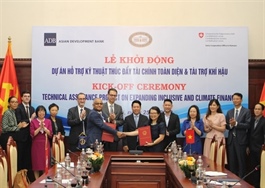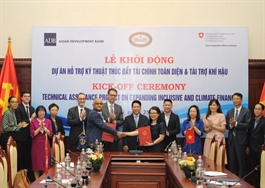VAFI raises concern over new tax method
VAFI raises concern over new tax method
The Vietnam Association of Financial Investors (VAFI) has proposed not to include the option of applying special consumption tax using a mixed method in the draft revised special consumption tax law.

VAFI raised concern in its document on the draft revised special consumption to the Prime Minister and related ministries that all businesses in the beer industry are worried that the largest leading business will have many tax incentives and competitive advantages if the special consumption tax calculation method changes from the relative method to the mixed method.
The reason given that with the mixed method of calculating special sales tax may make small and medium-sized businesses quickly go bankrupt because they have to pay an absolute tax rate that is too high compared to the selling price.
Currently, there are some opinions suggesting that Vietnam should research and apply the method of calculating absolute tax or mixed tax on alcohol and beer products, as some countries around the world are applying.
However, it should be noted that Vietnam's alcohol market has very different characteristics compared to countries around the world, so the choice of which tax calculation method to apply must be made by policymakers carefully.
According to Dr. Vo Tri Thanh, director of the Research Institute for Brand Strategy and Competition, up to now, there has not been much in-depth research on the appropriateness of tax rates and special consumption tax methods for beer and wine in Vietnam.
Meanwhile, the former director of the Tax Administration Department of Large Enterprises under the General Department of Taxation under the Ministry of Finance Nguyen Van Phung said that there are some opinions in favour of the method of calculating the absolute tax and the mixed tax applied to alcohol and beer products.
Many countries have applied it to limit the consumption and production of items harmful to health. However, the agency in charge of drafting the Law holds the view that this tax calculation method has not been applied to alcohol and maintains the tax calculation method as a percentage because it is suitable with the reality of Vietnam in both the present and in many future development stages of the country.
“From a personal point of view, on the basis of studying the principles and practices of countries with similar conditions like Vietnam, I think it is necessary to consider and evaluate the prospects of the macroeconomy, market operations, the current situation, and the health of enterprises that are directly affected by changes in the excise tax policy. From there, we can consider tax calculation methods, objectives, and policy ethics, and avoid creating a negative impact on domestic Vietnamese brand manufacturers,” he said
Currently, up to 80 per cent of the market share is in popular Vietnamese brand beer. Tax collection by the percentage method has the advantage of high price-high tax and low price-low tax. Enterprises, the State, and consumers share risks and benefits when prices change. On the contrary, the imposition of an absolute tax will create a higher price level, causing a decrease in purchasing power, leading to reduced revenue, production capacity, and even loss.
The ensuing impact is narrowing the scale of operations and reducing the business efficiency of the service sector, tourism, and entertainment industries, where alcohol products are used for the consumer needs of visitors. The next consequence is that the market share of Vietnamese beer production is reduced, and international beer products will gradually replace and dominate the market.




























